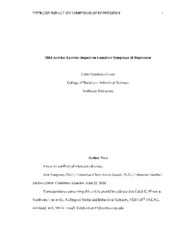| dc.description.abstract | The author of this paper researched the effect that mild aerobic exercise, as measured in average steps per day, had on cognitive symptoms of depression including attention/concentration, planning/organization, retrospective memory, and prospective memory, as well as mood/physical symptoms of depression, and satisfaction with life. The current study was a pretest-posttest control-group between-subjects true experimental design that had a convenience sample of 10 participants with diagnoses of depression receiving behavioral health services in a primary care medical center. Five participants were randomly assigned to a control group and asked to keep track of their steps per day, while five participants were assigned to an experimental group and asked to increase their steps per day as close to 10,000 steps per day as possible. Average steps per day were measured by the pedometer application Runtastic Steps, cognitive symptoms of depression were measured through the Perceived Deficits Questionnaire - Depression (PDQ-D), mood/physical symptoms of depression were measured through the Patient Health Questionnaire- 9 Item (PHQ-9), and satisfaction with life was measured through the Satisfaction with Life Scale (SWLS). A one-way analysis of variance (ANOVA) indicated no significant difference between average steps per day between the control group (M = 3,209, SD = 1,943.88) and the experimental group (M = 4,600, SD = 1,294.22), F(1,9) = 1.77, p = ns. A one-way multivariate analysis of variance (MANOVA) indicated no statistical significance between the independent variable of mild aerobic exercise on the dependent variables of attention/concentration, planning/organization, retrospective memory, prospective memory, mood/physical symptoms of depression, and satisfaction with life V = .79, F(6, 3) = 1.97, p = ns. Lack of significant results may be related to sample size rather than a lack of true statistical significance between the variables. While no significant differences were found, participants, on average, had improvements across all three domains. | en |


 Maintained by the Northwest University Library
Maintained by the Northwest University Library